From Medicine to Mercy
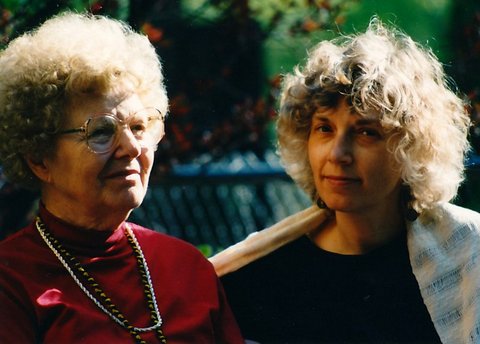
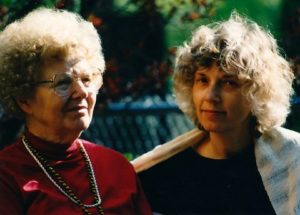
In 1998, a staff member at the senile dementia home in Rochester found Mom passed out on the bathroom floor, bleeding internally, moving gently toward death. Mom’s husband Herlie wasn’t ready to let go, so he rescinded the Do Not Resuscitate order she had signed ten years before, overriding her clear intentions.
Mom endured four weeks in the hospital, transfusion after transfusion, followed by surgery, followed by incessant needles taking blood samples out and putting new blood and nutrients in. My polite mother who never raised her voice screamed in protest and ripped out the IV lines. They tied her arms and put thick mittens on her hands, but she escaped her restraints like Houdini. Then she bit the tubes in half.
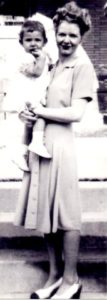
“They’re trying to help you, Mom,” I pleaded as I lay across her fragile, flailing body, holding her so a technician could draw blood.
“They’re doing a lousy job,” she howled in my ear.
Two weeks after they discharged her to the nursing home, her husband Herlie called.
“They tried to put a new IV line in your mother, because the doctor says she is dying of malnutrition,” he said. “She’s fighting like a wild animal. They called the hospital to get a special nurse to sedate her and put the line in.”
What? No one mentioned this possibility when I was at the nursing home two days ago. Tie her down and terrify her again? The knot in my gut shrieked, Absolutely not! Somehow, I spoke in a calm, measured tone.
“Could you delay the intravenous feeding until the family has a conference call with the doctor?” I asked. Herlie agreed.
My brother Jim and I joined the doctor and Herlie on the phone the next morning. The doctor gave my mom’s case history: unhealed infected wound from ulcer surgery, alarmingly low serum albumin levels, severe malnutrition and dehydration. Then there was her advanced dementia and combat-ready attitude. She bit, scratched, and screamed; she ripped the stethoscope from his ears. The doctor’s calm voice betrayed no feeling. I struggled to hold back tears. Finally, the doctor listed tortuous options, each sentencing my mother to months of medical invasion, sedation, and restraint.
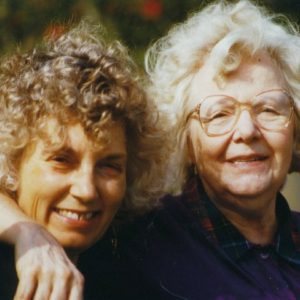
“What would you do if this were your mother?” I interrupted.
There was a long pause.
“Sometimes I must speak as a doctor. Sometimes I must speak as a human being. They are not always compatible,” he whispered. “I would make her comfortable and call Hospice.”
“We could stop all medical intervention?” I ask.
“Yes,” the doctor said, and Jim agreed. After another long pause, Herlie agreed. We were silent, suspended, waiting for Herlie to change his mind, but he didn’t. We took a breath and thanked the doctor, our relieved words spilling out and crashing into each other.

A few days later, I drove to the nursing home to meet the new Hospice aide. Mom sat in her wheelchair, studying the snaps on her blue flowered smock. She looked up with bewildered pale blue eyes and smiled for the first time in six weeks. She didn’t know I was her daughter, but she trusted me. I coaxed her to swallow tiny bites of pureed food and sip chocolate Ensure through a straw. Soon, she begged to go to sleep, moaning softly as the aide and I tucked her in. The wild woman had become a sweet baby girl.
“I like it here at your house,” she said quietly, her bony arm drawing a vague circle in the air. I had a feeling she would stay a while.
***
This article was one of my first blogs in 2012. I’ve added a few photos but kept the text the same. For other articles about my mother and me, see My Mother’s Rules: Good Grades and No Babies or for a story of her last years, Mother-Daughter Healing: An Alzheimer’s Story.

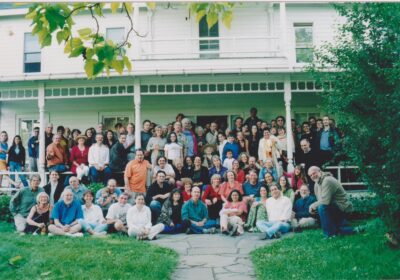

May 31, 2012 at 8:24 pm
Jill Swenson
To tell this story so we can all take its lessons to heart is a great gift, Elaine. Keep writing. I enjoy reading your words.
May 31, 2012 at 10:27 pm
Elaine Mansfield
Thank you, Jill. This experience pushed me to articulate what I want at the end of my life, including making sure that the ones who will be in charge understand and agree.
May 31, 2012 at 10:46 am
Lynne Taetzsch
Elaine, I know how desperate this situation can be at the end of life. I went through it with my husband, but fortunately he had a strong living will and we all agreed we needed to abide by his wishes. Hospice was amazing in helping all of us get through the end of his life and afterwards.
May 31, 2012 at 2:21 pm
Elaine Mansfield
Thanks for your comments, Lynne. My husband Vic and I made strongly worded living wills with our doctor Michael Eisman. In the last days of his life, Vic took a quick nosedive while on chemotherapy. I had to make the decision to stop treatment, but I knew what Vic wanted and what I needed to do. Hospice supported us for a few days at the end after treatment ended. Since my sons will have to make these decisions for me, I’ve had long talks about what I want with both of them. (Apparently my mother did not have these talks with her husband.)
I look forward to exploring your website and reading your blog.
May 29, 2012 at 6:46 pm
Gail Birnbaum
What a wonderfully written story, Elaine. I wept a bit as I remembered my own mother’s passing which was also fraught with unwanted medical intervention. Thank you for sharing.
May 30, 2012 at 8:07 am
Elaine Mansfield
Thanks for your message, Gail. It’s always hard to make these end of life calls, but Mom had seen her mother linger for far too many years with Alzheimer’s Disease and wanted to prevent this from happening to her. Even though Mom had a Do Not Resuscitate order, I learned that it is important to talk to everyone in the family about your DNR wishes since it is easy for the family to overturn the DNR when they are panicked and the patient they love is incapacitated.
May 30, 2012 at 1:13 pm
lourdes
Elaine, Your piece alerts me to be mindful that any DNR orders are useless if those around us do not respect our wishes. May I have the courage to carry out the desire of my dear ones!
May 30, 2012 at 2:08 pm
Elaine Mansfield
Yes, we learned this lesson the hard way, but I’m glad I know now. It’s important to have those hard conversations before we are sick.